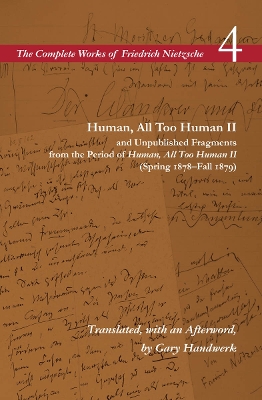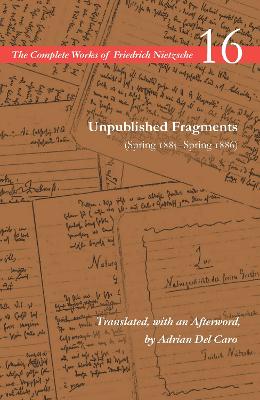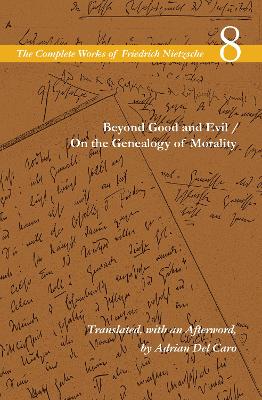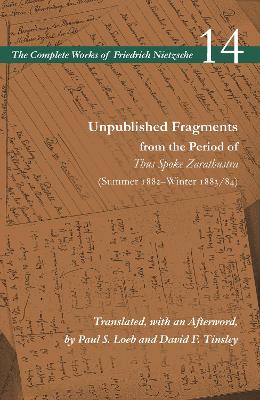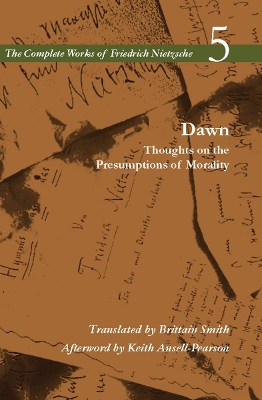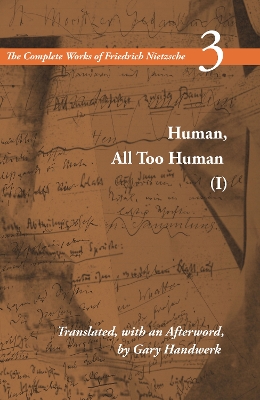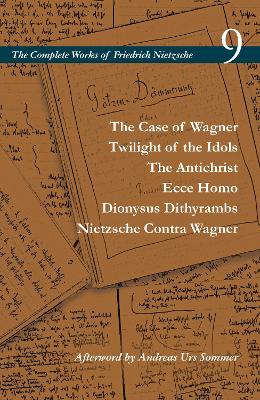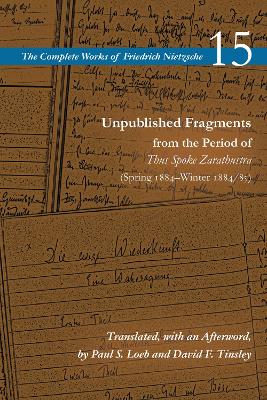The Complete Works of Friedrich Nietzsche
9 total works
Volume 4 of The Complete Works of Friedrich Nietzsche contains two works, Mixed Opinions and Maxims (1879) and The Wanderer and His Shadow (1880), originally published separately, then republished together in the 1886 edition of Nietzsche's works. They mingle aphorisms drawn from notebooks of 1875-79, years when worsening health forced Nietzsche toward an increasingly solitary existence. Like its predecessor, Human, All Too Human II is above all an act of resistance not only to the intellectual influences that Nietzsche felt called upon to critique, but to the basic physical facts of his daily life. It turns an increasingly sharply formulated genealogical method of analysis toward Nietzsche's persistent concerns—metaphysics, morality, religion, art, style, society, politics and culture. The notebook entries included here offer a window into the intellectual sources behind Nietzsche's evolution as a philosopher, the reading and self-reflection that nourished his lines of thought. The linking of notebook entries to specific published aphorisms, included in the notes, allows readers of Nietzsche in English to trace for the first time the intensive process of revision through which he transformed raw notebook material into the finely crafted sequences of aphoristic reflection that signal his distinctiveness as a philosophical stylist.
This volume of The Complete Works provides the first English translation of all Nietzsche's unpublished notes from April 1885 to the summer of 1886, the period in which he wrote his breakthrough philosophical books Beyond Good and Evil and On the Genealogy of Morality. Keen to reinvent himself after Thus Spoke Zarathustra, the philosopher used these unpublished notes to chart his search for a new philosophical voice. The notebooks contain copious drafts of book titles; critical retrospection on his earlier projects; a critique of the feminine; prophetic commentary on Germany; and forays into metaphysics, epistemology, ethics, aesthetics, and language. They also reveal his deep concern for Europe and its future and a burgeoning presence of the Dionysian. We learn what Nietzsche was reading and from whom he borrowed, and we find a considerable portion of notes and fragments from the non-book "Will to Power," though here they are unembellished and unmediated. Richly annotated and accompanied by a detailed translator's afterword, this landmark volume sheds light on the controversy surrounding the Nachlass of the 1880s.
Beyond Good and Evil is Nietzsche's first sustained philosophical treatment of issues important to him. Unlike the expository prose of the essayistic period (1872-76), the stylized forays and jabs of the aphoristic period (1878-82), and the lyrical-philosophical rhetoric of the Zarathustra-period (1882-85), Beyond Good and Evil inscribes itself boldly into the history of philosophy, challenging ancient and modern notions of philosophy's achievements and insisting on a new task for "new philosophers." This is a watershed book for Nietzsche and for philosophy in the modern era. On the Genealogy of Morality applies Nietzsche's celebrated genealogical method, honed in the earlier aphoristic writings, to the problem of morality's influence on the human species. In three treatises that strikingly anticipate insights appearing much later in Freud's Civilization and Its Discontents (1930), Nietzsche provides an anthropological psychograph of our species, revealing the origins of the concepts of good and evil, the roles played by guilt and bad conscience, and the persistence of ascetic ideals. Manifesting a hopeful yet unsentimental assessment of the human condition, these books resonated throughout the 20th century and continue to exert broad appeal.
With this latest book in the series, Stanford continues its English-language publication of the famed Colli-Montinari edition of Nietzsche's complete works, which include the philosopher's notebooks and early unpublished writings. Scrupulously edited so as to establish a new standard for the field, each volume includes an Afterword that presents and contextualizes the material therein.
This volume provides the first English translation of Nietzsche's unpublished notebooks from 1882-1884, the period in which he was composing the book that he considered his best and most important work, Thus Spoke Zarathustra. Crucial transitional documents in Nietzsche's intellectual development, the notebooks mark a shift into what is widely regarded as the philosopher's mature period. They reveal his long-term design of a fictional tetralogy charting the philosophical, pedagogical, and psychological journeys of his alter-ego, Zarathustra. Here, in nuce, appear Zarathustra's teaching about the death of God; his discovery that the secret of life is the will to power; and his most profound and most frightening thought-that his own life, human history, and the entire cosmos will eternally return. During this same period, Nietzsche was also composing preparatory notes for his next book, Beyond Good and Evil, and the notebooks are especially significant for the insight they provide into his evolving theory of drives, his critical ideas about the nature and history of morality, and his initial thoughts on one of his best-known concepts, the superhuman (UEbermensch).
Dawn is the most recent volume to appear in the first complete, critical, and annotated English edition of all of Nietzsche's work. The edition, organized originally by Ernst Behler and Bernd Magnus, is a translation of the celebrated Kritische Studienausgabe in 15 Bänden (1980) edited by Giorgio Colli and Mazzino Montinari. The book is the first to appear under the editorial direction of Alan D. Schrift, Keith Ansell-Pearson, and Duncan Large, and to incorporate subsequent corrections to the 1980 edition.
Continuing the positivistic turn of Human, All Too Human, Dawn is the second installment in the free spirit trilogy that culminated in The Joyful Science. One of Nietzsche's "yes-saying" books, it marks his first significant confrontation with morality and offers glimpses of many of the signature themes in his mature works. Dawn has come to be admired in recent years for its ethical naturalism, psychological observations, and therapeutic insights. Presented in Nietzsche's aphoristic style, it is a text with hidden riches, one that must be read between the lines and one that the discerning reader will admire and cherish.
This is the second volume to appear in an edition that will be the first complete, critical, and annotated English translation of all of Nietzsche’s work. Volume 2: Unfashionable Observations, translated by Richard T. Gray, was published in 1995. The edition is a new English translation, by various hands, of the celebrated Colli-Montinari edition, which has been acclaimed as one of the most important works of scholarship in the humanities in the last quarter century. The original Italian edition was simultaneously published in French, German, and Japanese.
This volume of Human, All Too Human, the first of two parts, is the earliest of Nietzsche’s works in which his philosophical concerns and methodologies can be glimpsed. In this work Nietzsche began to establish the intellectual difference from his own cultural milieu and time that makes him our contemporary. Published in 1878, it marks both a stylistic and an intellectual shift away from Nietzsche’s own youthful affiliation with Romantic excesses of German thought and culture typified by Wagnerian opera.
Unpublished Writings from the Period of Unfashionable Observations
by Friedrich Nietzsche
This is the third volume to appear in an edition that will be the first complete, critical, and annotated English translation of all of Nietzsche's work. Volume 2: Unfashionable Observations, translated by Richard T. Gray, was published in 1995; Volume 3: Human, All Too Human (I), translated by Gary Handwerk, was published in 1997. The edition is a new English translation, by various hands, of the celebrated Colli-Montinari edition, which has been acclaimed as one of the most important works of scholarship in the humanities in the last half century.
The present volume provides for the first time English translations of all of Nietzsche's unpublished notebooks from the summer of 1872 to the end of 1874. The major works published in this period were the first three Unfashionable Observations: "David Strauss the Confessor and the Writer," "On the Utility and Liability of History for Life," and "Schopenhauer as Educator." Translations of the preliminary notes for these pieces are coordinated with the translations of the published texts printed in Volume 2: Unfashionable Observations.
The content of these notebooks goes far beyond the notes and plans for published and unpublished Unfashionable Observations, encompassing numerous sketches related to Nietzsche's major philological project from this period, a book on the pre-Platonic Greek philosophers. The ideas that emerged from Nietzsche's deliberations on these early Greek thinkers are absolutely central to his thought from this period and contribute in significant ways to the development of several of his major themes: the role of the philosopher vis-a-vis his age and the surrounding culture; the relationships among philosophy, art, and culture; the metaphorical nature of language and its relationship to knowledge; the unmasking of the modern drive for absolute "truth" as a palliative against the horror of existence; and Nietzsche's "unfashionable" attack on modern science and modern culture, especially on the Germany of the Bismarck Reich. These notebooks represent important transitional documents in Nietzsche's intellectual development, marking, among other things, the shift away from philological studies toward unabashed cultural criticism.
The year 1888 marked the last year of Friedrich Nietzsche's intellectual career and the culmination of his philosophical development. In that final productive year, he worked on six books, all of which are now, for the first time, presented in English in a single volume. Together these new translations provide a fundamental and complete introduction to Nietzsche's mature thought and to the virtuosity and versatility of his most fully developed style.
The writings included here have a bold, sometimes radical tone that can be connected to Nietzsche's rising profile and growing confidence. In The Antichrist, we are offered an extended critique of Christianity and Christian morality alongside blunt diagnoses of contemporary Europe's cultural decadence. In Dionysus Dithyrambs we are presented with his only work composed exclusively of poetry, and in Twilight of the Idols we find a succinct summary of his mature philosophical views. At times the works are also openly personal, as in The Case of Wagner, which presents Nietzsche's attempt to settle accounts with his former close friend, German composer Richard Wagner, and in his provocative autobiography, Ecce Homo, which sees Nietzsche taking stock of his past and future while also reflecting on many of his earlier texts.
Scrupulously edited, this critical volume also includes commentary by esteemed Nietzsche scholar Andreas Urs Sommer. Through this new collection, students and scholars are given an essential introduction to Nietzsche's late thought.
This volume provides the first English translation of Nietzsche's unpublished notes from the spring of 1884 through the winter of 1884–85, the period in which he was composing the fourth and final part of his favorite work, Thus Spoke Zarathustra. These notebooks therefore provide special insight into Nietzsche's philosophical concept of superior humans,as well as important clues to the identities of the famous nineteenth-century European figures who inspired Nietzsche's invention of fictional characters such as "the prophet," "the sorcerer," and "the ugliest human."In these notebooks, Nietzsche also further explores ideas that were introduced in the first three parts of Thus Spoke Zarathustra: Zarathustra's teaching about the death of God; his proclamation that it is time for humankind to overcome itself and create the superhumans; his discovery that the secret of life is the will to power; and his most profound thought—that the entire cosmos will eternally return.
Readers will encounter here a wealth of material that Nietzsche would include in his next book, Beyond Good and Evil, as he engages the ideas of Kant and Schopenhauer, challenges cultural icons like Richard Wagner, and mercilessly exposes the foibles of his contemporaries, especially of his fellow Germans. Readers will also discover an extensive collection of Nietzsche's poetry. Richly annotated and accompanied by a detailed translators' afterword, this volume showcases the cosmopolitanism at work in Nietzsche's multifaceted and critical exploration of aesthetic and cultural influences that transcend national (and nationalist) notions of literature, music, and culture.
